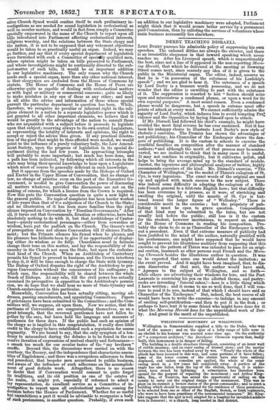DEBBY TEACHING DISTRTILL Loan DEBBY pursues his admirable policy of
suppressing his own speeches. The unheard ditties are always the sweeter, and there is an irresistible eloquent* in that inward speaking which never reaches us. After his Liverpool speech, which is unquestionably the best, since not a line of it appeared in the non-reporting Morn- ing Herald, that which he delivered at the meeting at Downing Street comes next, since scarcely any idea of it is given to the public in the Ministerial organ. The editor, indeed, assures us that he is "in possession of the substance of his Lordship's speech"; and we are glad to hear it. The substance of a speech by Lord Derby is a treasure worth possessing, and we do not wonder that the editor is unwilling to part with the substance of it. The suppression is resorted to lest "faction should seize upon and misconstrue a condensed phrase, or upon a word for its own especial purposes." A most Bound reason. Even a condensed phrase would be dangerous, but a speech in extenso must offer points of attack at every word. We cannot sufficiently admire the sagacity of Lord Derby, which induces him to avoid tempting Pro: videnee and the Opposition by laying himself open to attach. If Mr. Disraeli had followed his chief's example, he might have avoided the most fatal reverse he has ever sustained. But it has been his unhappy choice to illustrate Lord Derby's new style of rhetoric e converse. The Premier has shown the advantages of not publishing ; his Chancellor of the Exchequer shows the dan- gers of publishing. It is the custom in schools to exercise the youthful faculties on composition after the manner of standard authors; • and although the merit of that process may be contro- verted, we are inclined to think that in many eases it is useful. It may not conduce to originality, but it cultivates polish, and helps to bring the average mind up to the standard of models. Jacotot, the ingenious and philosophical analyzer of tuition, highly recommends exercises of the kind. Mr. Disraeli's exercise, "The Character of Wellington," on the model of Thiers's eulogium of St. Cyr, is very ingenious. The exact words of the original are used up and applied with much success to the new subject. There was indeed some difficulty in adapting the eulogium of a fifth- rate French general to a first-rate English hero; but that difficulty has been overcome by a process, as it were, of stretching and swelling the original until the mantle of St. Cyr is but- toned round the larger figure of "Wellesley." There is considerable merit in the exercise ; but the propriety of pub- lishing it must be open to grave question. Compositions of that kind may be submitted to the tutor, but are not usually laid before the public; still less is it the custom for the student, however meritorious to request an audience of the House of Commons in reading his composition. Pro- bably the claim to do so as Chancellor of the Exchequer is with- out aprecedent. Even if that extreme measure of publicity had justified ustified to the mind of the author, naturally gratified with his performance, one might have supposed that he would have sought to prevent his illustrious auditory from supposing that this exercise on the pattern of Thiers was intended to pass for an origi- nal oration, inasmuch as other persons read French and the Morn- ing Chromele besides the illustrious author in question. It was to be expected that some one would detect the imitation; as the event proved. And it might have been imagined, that, to dis- arm discoveries of that sort, the author would have said, " Apropos to the subject of Wellington, and so forth— while others are advertising their windows for hire, and the Poet Laureate is exercising his pen on the allotted theme, and pastry- cooks are inventing funeral cakes,'—here is a little thing which I have 'written; and it seems to me so well done that I will ven- ture to read it to you, instead of that which I should have said as Chancellor of the Rrehequer." But, indeed, the best course of all would have been to write the exercise—to indulge in any amount of smiling self-gratification—and then to put it in the desk ; or perhaps to have lent it to some friend who might have done for it what the Morning Herald does for the unpublished work of Der- by. And great is the merit of the unpublished.


























 Previous page
Previous page